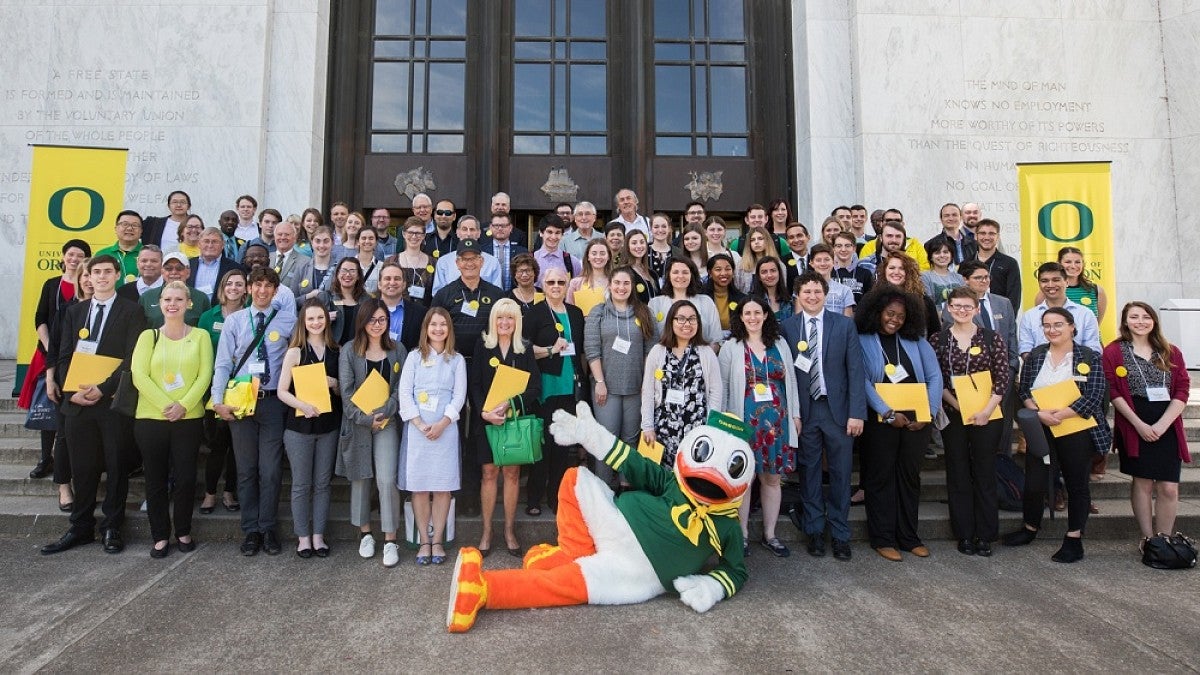The state’s recently concluded legislative session may be remembered most for the partisan politics that dominated its final days, but the UO and students in higher education will see some positive outcomes.
The Public University Support Fund, which funds Oregon’s seven public universities, was increased by $100 million, or 13.6 percent, to a total of $836.9 million. That is the second-largest increase in a single session since 1999.
The funding will help universities partially cover rising costs and keep tuition increases for Oregonians lower than they would have been otherwise. The increase brought the UO’s resident tuition increase down to 6.91 percent from 9.6 percent, or a $675 total annual increase for students taking 45 credits a year.
And the Oregon Opportunity Grant, the state’s primary need-based financial aid program for resident college and university students, increased by $12.5 million, or 8.6 percent, which will allow the grant to serve approximately 2,500 more students across the state.
Another success was a new $10 million University Research Innovation Fund administered through the Oregon Business Development Department. The fund will match competitive federal research awards, leveraging federal grants that require matching funds and supporting innovation and research capacity.
Grants will be targeted in priority industries, such as advanced manufacturing, high technology, outdoor gear and apparel, health care innovation, food and beverage, and forestry and wood products. Research and innovation faculty members and staff played a key role in lobbying for the fund, as did staff at the business development office.
“The University Research Innovation Fund is a good example of how sometimes it takes more than one session to get an idea cross the finish line, especially if it has a price tag attached,” said Libby Batlan, associate vice president for state and community affairs. “We introduced this concept in 2017, and while it was well received, it was not funded. We worked throughout the interim and came home with a win this time around.”
Lawmakers also funded deferred maintenance projects at $65 million, which will help make sure buildings and classrooms on campus are safe and up to date. Capital projects, including the UO’s renovation of Huestis Hall, will be on the agenda for funding in the 2020 session. The Legislature has approximately $315 million of bonding capacity to distribute in February.
State programs experienced a small increase in funds, including clinical legal education and the Dispute Resolution Program, Labor Education Research Center and TallWood Design Institute.
A law, House Bill 2030, was passed making the UO eligible to apply for seismic rehabilitation grants.
The campus veteran’s grant program, which provides funding for UO’s veteran’s service officer within the Division of Student Life, was renewed. The $54,000 grant the university currently receives from this program funds a half-time program coordinator, additional computers and technology, expanded student veteran engagement events and increased veteran welcome sessions.
Despite efforts by UO faculty members, students and staff who testified before various legislative committees, a number of bills did not pass that would have funded programs and initiatives to help Oregonians statewide. All the measures were unanimously approved by the House and Senate education committees but did not make it out of the ways and means process.
Those measures include funding for a new ocean-going research vessel for UO’s Oregon Institute of Marine Biology; a matching fund that could enable communities in rural areas to participate in the Sustainable City Year Program; funding for the UO’s prison education program through the Clark Honors College; and $12 million for the build-out of Oregon’s portion of the multihazard sensor network for the ShakeAlert earthquake early warning and wildfire prevention system.
“These are incredible projects and programs from UO faculty members and students, and we believe that they are of value to the state,” said Hans Bernard, assistant vice president for state affairs. “While it’s disappointing they weren’t funded this session, we won’t give up on making sure lawmakers understand their value and will be back in future sessions.”
The Legislature will convene again in February 2020.
For more detailed information about all the measures that passed that will have an impact on the UO, read the end of session report on the Government and Community Relations Web site


